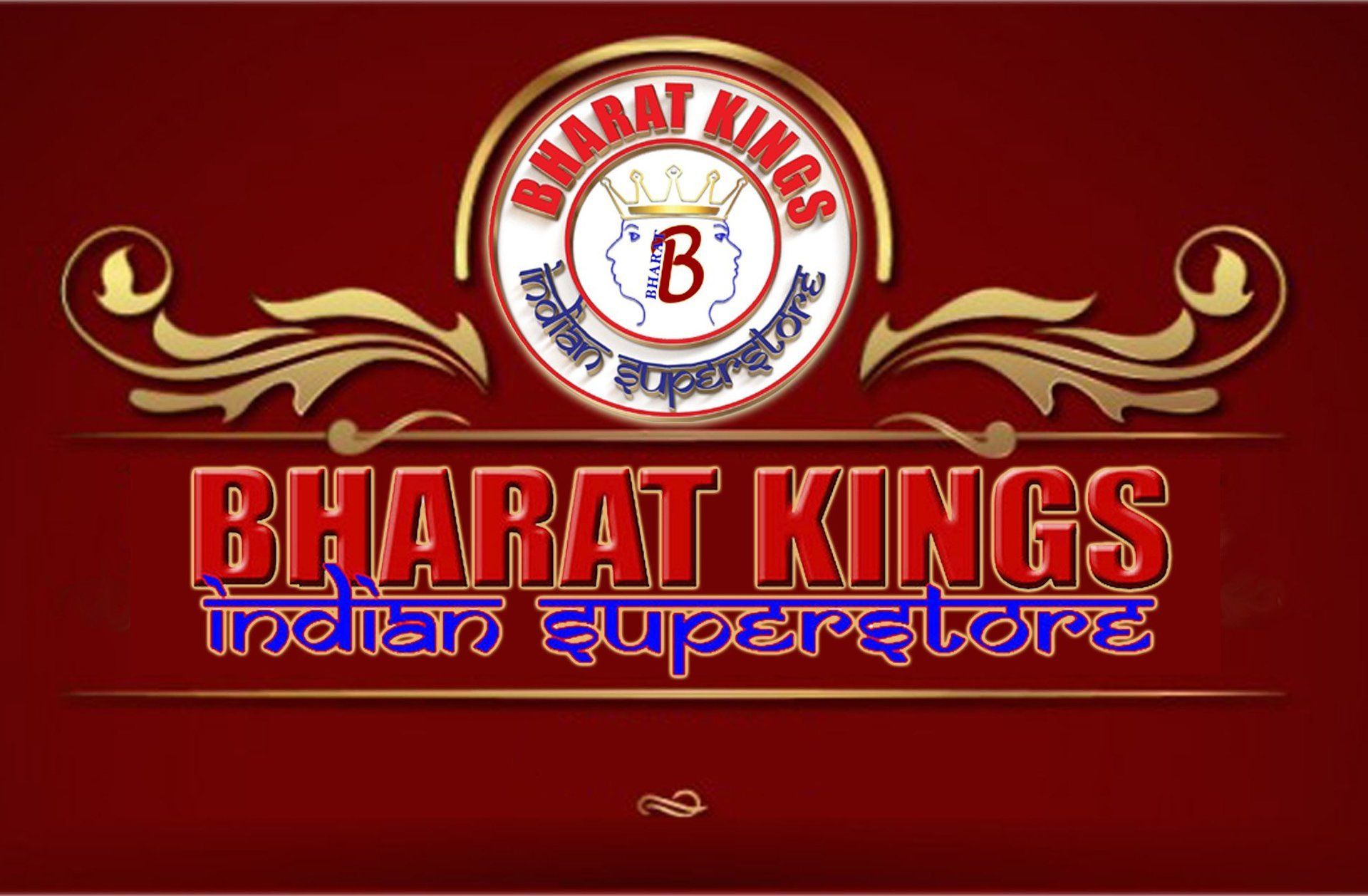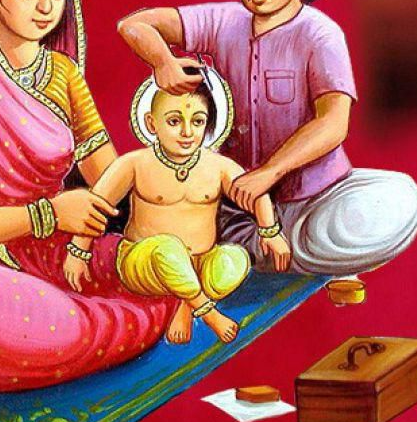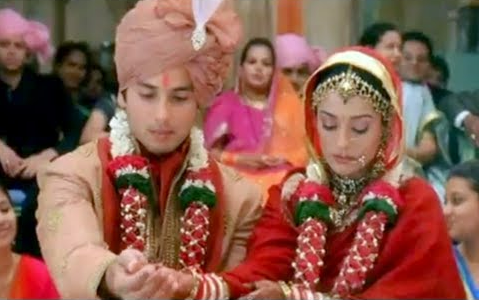Buy BK products online via Webshop
A Hindu has different phases of life and the associated rituals that accentuate and enrich these phases. These rituals become "Sanskaars" called , which means "to improve", "to cleanse" or "to teach spiritually". These lessons are intended to make yourself and the people around you aware that you are starting a new phase and will then behave differently as you enter a phase. Everyone must open themselves up to the new phase of life, where the people around you must also give you the space to develop. The transition to a new phase of life is recorded with rituals and promises that are sealed by the divine.
16 Sanskaars
(16Phases in a Hindu's life)
A Hindu has different phases of life and the associated rituals that accentuate and enrich these phases. These rituals become "Sanskaars" called , which means "to improve", "to cleanse" or "to teach spiritually". These lessons are intended to make yourself and the people around you aware that you are starting a new phase and will then behave differently as you enter a phase. Everyone must open themselves up to the new phase of life, where the people around you must also give you the space to develop. The transition to a new phase of life is recorded with rituals and promises that are sealed by the divine.
The sanskaars begin even before the birth of a child and extend beyond death. Every time the life of the Hindu enters a new phase, a sanskaar takes place. A sanskaar can be seen as a door that provides access to a new phase in life. A sanskaar also provides the individual with the resources he needs in the new phase of life. A sanskaar is basically a cleansing process where the "evil" including "ignorance" is eliminated and makes way for whatever is necessary to achieve the highest goal, namely moksh (salvation).
There are a considerable number of sanskaars of which the following are the most important:
Garbhadhaan-sanskaar (Impregnation Ritual)
This sanskaar takes place before the moment of conception. Conception is seen as a sacred act that takes place at the most auspicious time possible. With this, the expectant parents bring new life into their own lives. When a couple is struggling to conceive a child, they can perform a pooja to encourage this.
Poensawan-sanskaar
In the third month of pregnancy, new life is welcomed with various mantras.
Siemantonayan-sanskaar
This sanskaar takes place in the seventh month of pregnancy. The recitation of mantras aims to protect the mother and child against evil influences. The ceremony supports favorable development of the embryo.
Djaatkarm-sanskaar
This sanskaar takes place immediately after the birth of the child. The newborn child is welcomed by the father. He prays for the well-being of the child and feeds him with honey and ghie (= clarified butter). The father whispers mantras (sacred sayings) into the baby's ear. The child is returned to the mother and is then given the first breastfeed. The songs sung at the birth of a child are called sohars.
Naamkaran sanskaar
The newborn child acquires a name after reciting sacred mantras. The name is derived from the child's birth chart.
Nieshkraman sanskaar
A newborn child is raised in a very protected environment and usually stays indoors. The child grows older and there comes a time when he or she starts exploring the outside world. Outside, a child has to deal with impressions and influences that sometimes do not correspond with the values and norms that he or she has developed so far. The Nieshkraman sanskaar provides some protection against those influences.
Anprashna sanskaar
This ceremony takes place in the sixth month after birth. This is the time when the child is given solid food for the first time. The Anprashna-sanskaar consists of reciting mantras and a pujaa (service to god).
Choerraakarna-sanskaar (Moerran-sanskaar / moenddan-sanskaar)
The hair that a baby received at birth is considered unclean. This must be shaved away to make room for new (strong and clean) hair. A "pujaa" also takes place during this sanskaar.
Karnawedh-sanskaar
A hole is pierced on the child's earlobe, which serves, among other things, to promote health.
Wiedyaa-aarambh-sanskaar
This sanskaar takes place when the child starts learning to read and write. The sanskaar provides means to make optimal use of the mind.
Oepnayan-sanskaar (Djanéw-sanskaar) Yagjopawitra sanskaar
Boys between the ages of five and 12 receive the sacred thread (three strands of yarn tied together). This is seen as a kind of “second birth”. After this the child is considered fit to begin his studies and life of simplicity and celibacy in the school of the guru (preceptor).
This is usually beneficial at the beginning of the holidays before the child goes to first grade.
Wéd Shaastra -aarambh-sanskaar
Once a student has reached a certain level he can begin the study of the Vedas and the Bhagavad Gita (sacred scriptures).
Keshaant-sanskaar
When the child enters puberty he is shaved again. This reminds the student that he must continue to focus on his studies, now that new feelings are awakening in him.
Samaawartan-sanskaar
After the study of the Wéds, this sanskaar takes place and the student can return home.
Wiewaah-sanskaar (Wedding Ceremony / Ritual) Bhia Sanskaar.
The Wiewaah sanskaar is one of the most important Sanskaars and concerns the blessing of marriage. The student has graduated and is expected to be able to support himself and his family. The main ceremony, which lasts at least three hours, symbolically covers all aspects of the daily life and duties of husband and wife.
Antyeshtie-sanskaar (Dah Kriya-antim Sanskaar)
This sanskaar is performed by those left behind, usually by the eldest son. With the help of the rituals, the deceased says goodbye to life.
Of the 16 sankaars mentioned above, these sankaars below are the most famous:
Somwar,/ Monday - Gods: Shiva
favorite food Persad : Dhania persad sugarcane
Mangalwar ,/ Tuesday .- Gods : Hanuman
favorite food Persad: Roth
Bhudwar ,/ Wednesday .- Gods: ganesh
favorite food Persad: Laddu
Brihaspatiwar-Guruwar,/Thursday.-Deities: vishnu-krishna
favorite food Persad : Mohanbhog-Mitha Bhaat
Sukrawar ,/ Friday .- Gods : Durga Mata -Laxmi Mata
Favorite food Persad: Lapsi Roti
Shaniwar ,/ Saturday .- Gods: Shani dew
favorite food Persad: Sarso
Raviwar ,/ Sunday .- Gods : Surya
favorite food Persad:
The following foods are usually used during a puja:
* mohanbhog * laddu * lapsi roti * roth * mitha bhaat
* coconut * pandjierie (rice flour) * phal
All the mentioned prasaad can be used on any occasion.
Sanskaar / Ritual
Sanskaar / Ritual
Sanskaar / Ritual
Sanskaar / Ritual
Pooja shop The Hague
Pooja store in the Netherlands via webshop
Pooja shop Rotterdam, Pooja shop Amsterdam, Pooja shop Utrecht, Pooja shop Almere, Pooja shop Leiden, Pooja shop Amstelveen,
Pooja shop Brabant, Pooja shop Tilburg, Pooja shop Breda, Pooja shop Hoofddorp, Pooja shop Hoogvliet.












